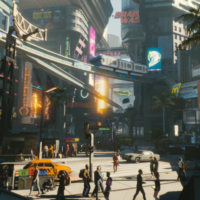Analysis: Cyberpunk 2077's Crunch Controversy
by on 17th Jan 2020 in News


CD Projekt Red has delayed the release of its eagerly anticipated sci-fi RPG Cyberpunk 2077.
The game will now miss its scheduled April release slot, instead arriving in September 17th this year. That puts it in a very busy slot for new releases, and may mean it competes for attention with the arrival of next-gen consoles like the PS5 and Xbox Series X; platforms it is not understood to support.
A release delay isn't the most unusual event in the game industry, of course, even on a such a high-profile title. Many fans will surely be disappointed, while others may share the optimistic logic that says 'if more time is needed to make a better game, I'm happy to wait'. That latter point is usually expressed with being supportive in mind, but there is at least a suggestion something much less ideal is underway at CD Projekt Red; namely 'crunch' - usually framed as intense overtime.
After announcing the game's five month delay, the Polish studio famed for its Witcher series hosted an investor call, and the revised release date inevitably came up. That's when Adam Kiciński, president and CEO of the developer's parent company and publisher CD Projekt confirmed the reasoning behind the delay, and admitted crunch would likely be part of the solution to getting the game over the line. It also emerged that the development team only found out 'minutes' before the decision was revealed.
"Why now? Why three months before release?" Kiciński said on the investor call. "Well, we have been waiting and there always comes the moment to decision. We are constantly evaluating the game and we decided if we are to delay this is the right moment, and that with the decision to add five months we would be really sure that we can deliver what we had planned. Of course, it was a tough decision, but we and our team - which was informed minutes ago - think that this was a good decision and that having an extra five months will enable us to deliver a perfect game."
The staff finding out late is a curious detail, and its not clear if that refers to the time before the investor call, or before the announcement to the public, which came via Twitter.
We have important news regarding Cyberpunk 2077’s release date we’d like to share with you today. pic.twitter.com/aWdtR0grYV
— CD PROJEKT RED (@CDPROJEKTRED) January 16, 2020
The more controversial detail, however, came when conversation turned to how the studio would meet the new release deadline.
An anonymous participant in the call asked a simple question: "Is the development team required to put in crunch hours?"
"To some degree, yes - to be honest," came Kiciński's reply. "We try to limit crunch as much as possible, but it is the final stage. We try to be reasonable in this regard, but yes. Unfortunately."
Crunch is a relative term without any hard agreed meaning. Essentially, crunch is any degree of overtime, but it typically refers to long stretches of back-to-back working very late and starting early. And it has become and increasingly controversial practice in the game industry.
Working late and through the small hours is almost part of the game programmer cliche, and that may come from crunch. A couple of decades ago crunch was almost a badge of pride. There were tales of devs spending days - or even weeks - sleeping under their desks in sleeping bags, rarely having the opportunity to leave. That is perhaps something of the mythos of crunch, and its hard to verify the exact details of such stories. However, it's almost certain that numerous developers have worked incredibly long hours for weeks on end without respite. Crunch in the 1990s was sometimes talked about as a sign of devotion and dedication, and that in turn fed into the notion that it was a normal part of the game making process.

Cyberpunk 2077's striking aesthetic has already won over numerous would-be players.
Now, in 2020, it's largely frowned upon, and seen as a reflection of poor planning and a lack of consideration for staff well-being or the benefits of work/life balance. In an era when the game industry is endeavouring to be progressive with regard to employee mental health, discrimination, workplace behaviour and more, crunch can be seen as a rather dated model.
Of course, that's not at all to say CD Projeckt Red is planning anything like the extreme crunch described above. There is no suggestion of that. And there is a counterpoint. Many will say they would happily work late at the closing stage of a project, or go the extra mile for their art.
But that is exactly what makes crunch controversial. When overtime is truly optional, it's hard to find serious fault in. When crunch is expected, built in as part of the plan, or expected of employees as standard, there is a problem. Again, that's not to say that is what CD Projeckt Red is doing here. Some, however, may take issue with Kiciński's assertion "but it is the final stage" as a justification of crunch. That could be understood to suggest crunch is seen as inevitable and standard at the studio.
Or, of course, this could be a matter of an ill worded reply to a participant on the investor call, or differences in understanding around 'crunch' as a term. Doing a little overtime and sleeping in the office for weeks are very different things; and nobody would assume CD Projekt Red expects its staff to do the latter.
Perhaps the most positive thing here is that crunch is in the game industry's collective conscience and conversation again. And as evidenced by the responses on Twitter, most are very keen to see the back of it.
Everyone that is like:
“Oh nice the Cyberpunk devs have more time to make a better game without crunch”Let this be absolutely clear:https://t.co/jgpfWu3lws pic.twitter.com/0Wx89ENR0h
— Eline Muijres ✨ (@ElineMuijres) January 17, 2020
I'd be fine with Cyberpunk 2077 delaying for another two years if it means the developers don't have to crunch for it.
— Commander Stephanie Sterling (@JimSterling) January 16, 2020
https://twitter.com/SimoRoth/status/1218121430572982272?s=20
Crunch is bad. https://t.co/rguRPhaUQJ
— Kotaku Australia (@KotakuAU) January 17, 2020
If you think things like this mean less crunch for developers, you are wrong. This means extra 6 months of crunch. https://t.co/e2qZsjSvuw
— Sos Sosowski (@Sosowski) January 16, 2020
AudienceConsoleDeveloperGamingPlayersPublisherTeamsUncategorized







Follow TheGamingEconomy